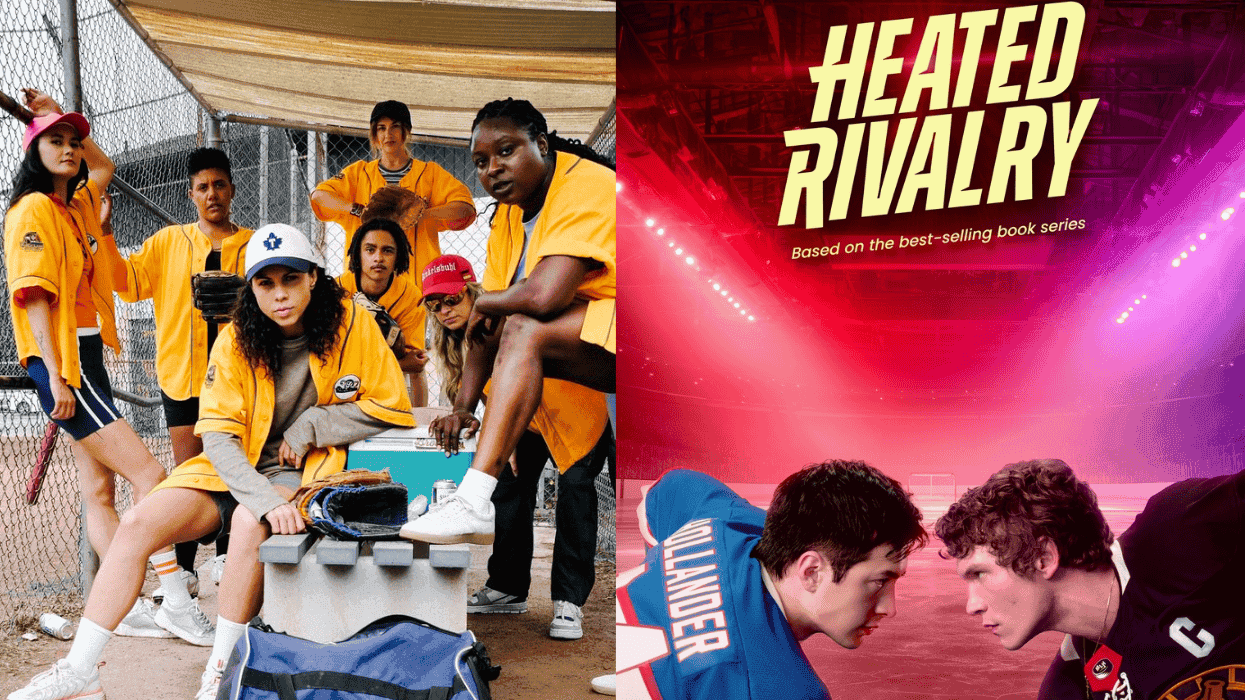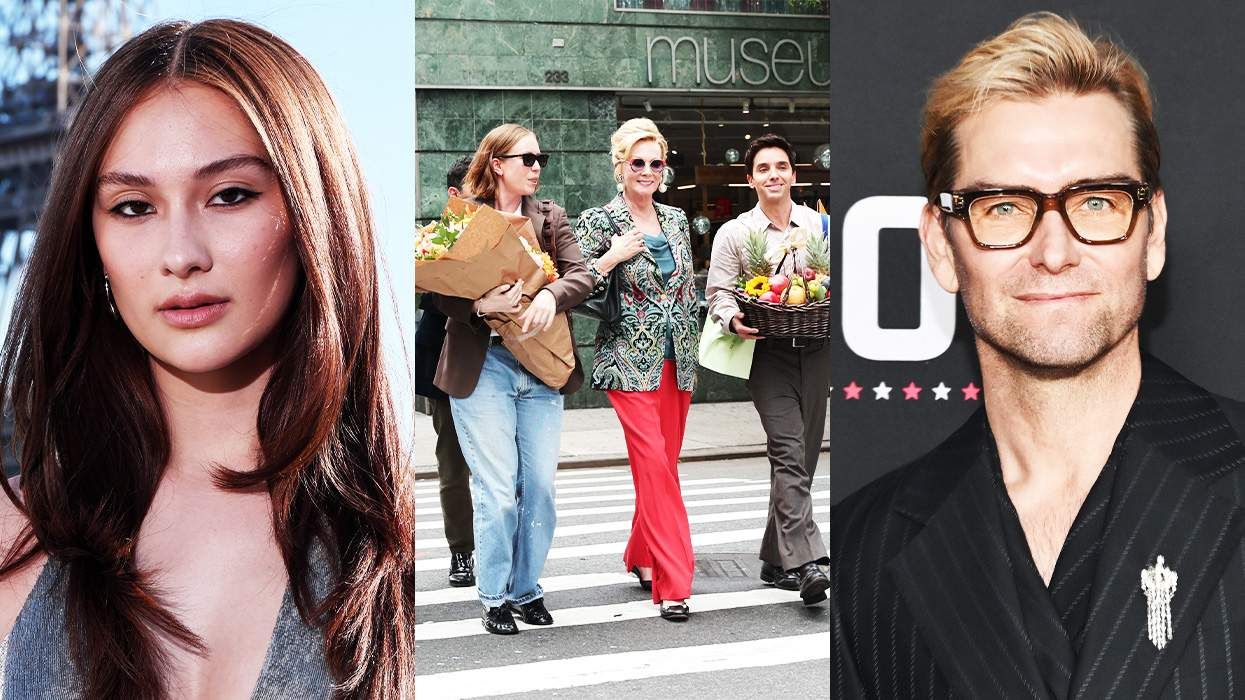Jackson Carter has spent the last eight weeks reveling in his role as a contestant on The Biggest Loser, as the first out gay man to appear on NBC's hit series. The 21-year-old Utah native became an instant fan favorite, especially back home in Ogden, where he attends Weber State University and mentors LGBT kids at the OUTreach Resource Center. The Advocate caught up with Carter to find out how the experience has been, why he went on the show, and what it was like to come out at 14.
The Advocate: What was your primary motivation for going on The Biggest Loser?
Jackson Carter: Probably my biggest motivation for auditioning for the show was my mama. She saw that I was sort of in a slump. I knew I was unhappy with where I was in my life, and I didn't know how to fix it. She charged me with the task of doing one thing every day that would better my life. When I saw the audition call for Loser, I saw it as a wonderful opportunity to take control of something in my life that has always ruled me: my weight. I also saw it as an excellent opportunity to help motivate the youth I mentor at the Ogden OUTreach Resource Center. Our mission statement states that we want to promote happy, healthy lives for LGBTQ plus people and allies. For the first time, I could be a role model in health and fitness. And, it was my new thing for the day. There was really no downside.
You're from Roosevelt, Utah, a small town on the Ute Indian reservation. Are you Native American? What was it like to be on reservation land as a kid?
I don't have a drop of Native blood in my body, which is unfortunate because I always struggle to find scholarships for a young, white man from a middle-class family. My family ended up on the reservation because I am from a long line of farmers, trappers, hunters, and oil riggers. Roosevelt offers a pretty great landscape for those occupations. But it's also a pretty rough landscape for chubby, white kids. The Indian kids would hit the couple of white kids in the school with rocks and call us names. This was really hard for me because at such a young age, 4 or 5, I just didn't understand what made me so different from these kids. This bullying led to a long life of emotional eating and the "need to please," as we called it on the [Biggest Loser] ranch. A lot of us had it because we had never really been accepted by society. We see it as an attributing factor of our weight gain.
You've always been bullied. Tell me about that.
Like I said, the bullying started very young. First for my race. I remember going home from preschool every day crying because I didn't have any friends. And while I had such loving, supportive parents, they weren't the best at dealing with emotions either. They solved everything with food and laughter. This taught me that eating would make all those bad feelings go away, which led to weight gain. Then I got picked on for being fat. That's when my family moved to the city. If I thought it was hard being white in an Indian school, I found it even harder to be a gay, fat, white kid who thought he was Indian. I had a mullet, which, while it was all the rage on the reservation, was not stylish in conservative, northern Utah, and I spoke with reservation slang. Ironically, I wasn't really bullied for my orientation [then]. By the time my sexuality became public knowledge, I had transferred to an arts school where sexuality was a non-issue and became an attendee of Ogden OUTreach. So, with the exception of a few jerks, my coming out experience was pretty good.
It's interesting that after being bullied, you changed one of those things (your weight) but not the other (orientation). Some feminists would urge you to accept both and be happy with your life. Why didn't you do that?
I would like to go on record saying that I did not go on to the show or lose weight because I was bullied for my weight. My decision to lose weight had nothing to do with what anyone else thought about it. I wasn't happy with my body, so I decided to work on it. And while it is still far from that toned, hairless, flawless twink body -- which is so sought after in the gay community -- for the first time in my entire life, I am happy with how I look. One thing I learned on the ranch is that the only thing that matters in the world is that I am happy with myself. It doesn't matter what anybody else thinks. For too long, I concerned myself with what others thought.
You came out at 14. I didn't come out until I was 18, so I'm always amazed when kids come out that early. Was that middle school or high school? What was it like at that age? How did your parents react?
It was in middle school when I first came out to a couple of friends. And even though my parents were so great about it, and I had a few close friends who loved and supported me, I still lived in fear every day. I was afraid every day that someone was going to find out and I would get beaten up for it -- or worse. It's not like my fears weren't justified. Particularly in the conservative area where I grew up, middle schoolers don't understand sexuality and gay or trans slurs are commonly used as insults. I remember there was a boy in eighth grade who wrote "Jackson Carter is a f****t" on my binder. This kid was a total jerk-wad and typically got his rocks off by humiliating me in front of his friends. Looking back, I think he may have struggled with his sexuality, so he took it out on me. There was another boy in my drama class who, when asked by the teacher what the one thing in the world he would banish if given the chance, said "homosexuality." That was the exact moment I realized that if I ever wanted to live somewhere where I could freely explore and express myself, I couldn't go to high school with these people.
What did you do?
I transferred to an arts school in Ogden, Utah, and instantly found my niche. After that, I really began to accept my sexuality. I had boyfriends through high school and found that, with few exceptions, people don't hate me because I'm gay. They just don't understand it. That's what drove me to work with youth at OUTreach. It was never DaVinci Academy's goal to create a safe haven for gay and trans teens. But over the years, it became the warm flame that attracted every gay moth in the area. In reality, there were only a handful of out gay kids, but, per capita, it may as well have been the San Francisco of Utah public schools.
That's awesome. Tell me about OUTreach and the work you do there. You're paying it forward, it sounds.
Ogden OUTreach is a non-profit youth resource center focused on creating a safe, more welcoming environment for queer people in northern Utah. We operate an after-school program on Wednesdays and Thursdays for teens to come get homework help, use the Internet, play games, meet other teens, get a warm meal, take a music or cooking class -- name a resource and we either have it or will make it happen. We also do a lot of work in the community from offering a comprehensive sex ed course through the health department, running programs that focus on the growing suicide and bullying epidemic in the country, running monthly community forums to discuss issues facing Utah's LGBTQ+ community, and our newest program: Safe and Sound. Partnering with Mormons Building Bridges, we are creating a network of Latter Day Saints/Mormon homes who are willing to take in kids who have been kicked out of their homes. We offer counseling services and mediation for the kids and their families with the ultimate goal of reuniting the family. We have our hand in every queer issue in our area. It's an incredible program and I am fortunate enough to serve as the volunteer coordinator and a member of the board of directors.
The new Mormon housing project sounds phenomenal. We have an article on it in our upcoming issue. Are you single? Partnered?
I am currently single, but I'm not swearing anything off.
What surprised you most about The Biggest Loser?
I had absolutely no idea how hard it would be. I mean, I watched the show all the time when I was younger and always heard the contestants talking about how tough it is. But from the couch, it's always easy to say "What? They can't do that? I could do that in my sleep!" To everyone who watches the show, and every competition show on TV, I'd like to say that it is harder than it looks by at least ten thousand percent.
Are you ready to be recognized on the street?
The show has been on the air for eight weeks now and I am still not used to all the attention. I have so many people approaching me, shaking my hand, and one time I got a bear hug from behind while I was at the gym. As far as I'm concerned, I'm still just a kid from small-town Utah. But every now and then, something happens that reminds me that I have been a major character on one of the highest rated shows on broadcast television. It's still a little weird.
















